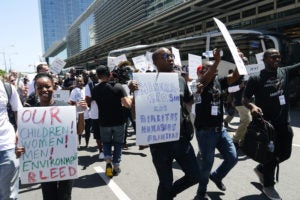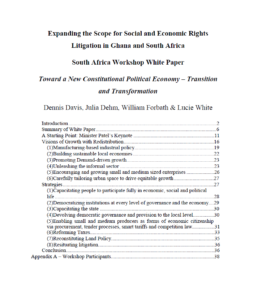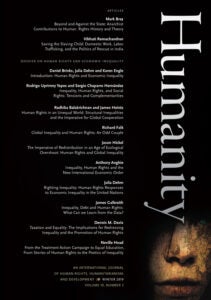
Resources
Explore a selection of working papers and scholarly resources related to the “Beyond the Future of Work” project.

In the summer of 2020 The Rapoport Center published four reports on COVID-19 “hotspots,” which foregrounded workers’ experiences of the pandemic and excavated the historically entrenched legal and political drivers that have made certain workers both essential and expendable.

Property Rights from Above and Below: Mining and Distributive Struggles in South Africa:
This report traces legal battles over mining in South Africa at the levels of international, domestic, and customary law. It outlines the tensions between competing conceptions of property rights, arguing that the very definition of property—not just the distribution of its entitlements—is at the heart of contemporary struggles.

This paper details the proceedings and debates that emerged from a two-day workshop in South Africa. The event, “Towards a Constitutional Political Economy – Transition and Transformation,” was held at the Kramer Law School at the University of Cape Town on May 20-21, 2017. It convened a group of heterodox economic thinkers with prominent social and economic rights advocates and policymakers to explore the prospect of reconstructing the South African political economy.

Power, Participation, and Private Regulatory Initiatives Human Rights Under Supply Chain Capitalism
This volume, which grew out of several meetings at the Rapoport Center and is edited by Center faculty and staff, was published by the University of Pennsylvania Press in 2021. It brings together academics and practitioners from a number of regions throughout the world to engage in theoretical analysis, case study exploration, and reflection on a variety of Private Regulatory Initiatives, designed to certify that actors along the supply chain conform to certain codes of conduct. Theorizing outward from the work of practitioners and activists on the ground, the book brings essential but often overlooked questions to the scholarly debates on business, human rights, and global governance.

Human rights and Economic Inequality [Special Issue, Humanity Journal 10(3) (2020)]
This special issue on human rights and inequality was conceptualized by, and features contributions from, past and current Rapoport Center team members. It engages with a variety of pressing themes and topics, including redistribution and ecological overshoot, the New International Economic Order, debt, taxation and poetics.
Beyond Inequality: New Paradigms for Addressing the Future of Work [Forthcoming]
This book attempts to contest and transform two of the most significant scholarly and political discourses around economic injustice today: those concerning global inequality and those about the “future of work.” It does so by moving beyond routine short-hand accounts of inequality and bringing into conversation the critical methods of racial capitalism, world-systems theory, and distributional analysis in order to enable us to address the range of very complex, historical, productive, extractive, and distributive processes that enable the world’s great disparities in power, wealth, and status to which conceptions of the future of work and livelihood are central. All three of these approaches are essential to understanding and challenging the structures and longstanding patterns that create and sustain pernicious asymmetries of wealth and power, within as well as among countries, especially in the world of work and the landscapes of livelihood.
The annotated bibliographies linked below function as a living resource for scholars, students, and activists that are researching, organizing around, and studying the various worlds of work and livelihood.
Beyond the Future of Work: New Paradigms for Addressing Global Inequality
Bibliography on Labor, Human Rights & Inequality
Beyond Inequality: The Past, Present, and Future of Work
Please feel free to email us additional resources, including your own work: humanrights@law.utexas.edu.
Resources for 2022 workshop in South Africa, “Labor, Land, Livelihoods in Crisis: New Conversations on the Future of Work”
